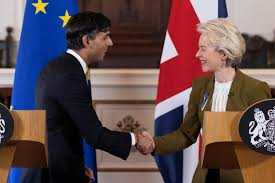
The UK prime minister Rishi Sunak and EU chief Ursula von der Leyen have signed an agreement that replaces the existing Northern Ireland Brexit protocol and will now be known as the Windsor Framework. They both said this was a “decisive breakthrough” and delivers smooth-flowing trade within the whole of the UK, protects Northern Ireland’s place in the union, safeguards sovereignty for the Northern Irish, and removes any sense of a border in the Irish Sea.
Mr Sunak said the new agreement marks a new chapter in the UK’s relationship with the EU and paid tribute to Ms Von der Leyen for her “vision” which allowed for a “new way forward”. The deal, will preserve the “delicate balance” in the 1998 Good Friday Agreement that protects the “aspirations and identity” of all people in Northern Ireland and end uncertainty.
The PM acknowledged that political parties would want to consider the proposals in detail and confirmed that the UK Parliament would have the opportunity to vote at the appropriate time and the results of that vote would be respected.
The deal will however need agreement from the Democratic Unionist Party (DUP) as their verdict will be crucial in deciding whether power-sharing at Northern Ireland’s seat of government at Stormont, resumes.
Protocol bill scrapped
The UK government and the EU have been negotiating a post Brexit trade agreement for Northern Ireland for some time now, but until recently they were a good way apart. It seems that Mr Sunak has managed to make progress where his predecessors had previously failed. He has managed to persuade the EU to compromise on the protocol bill, that had meant that the EU could, essentially, impose laws on the people of Northern Ireland, without them having any say.
What the new deal has effectively done is scrap 1,700 pages of law that had been written by the EU into the protocol bill, and Mr Sunak confirmed that the amount of EU law which now applies to Northern Ireland amounts to no more than 3%, which by anyone’s reckoning is pretty good going.
Stormont break is a safety net
Additionally, the new “Windsor Framework” has introduced what is referred to as the “Stormont Break”, which gives Northern Ireland the power to block EU laws if it there is cause to believe such action necessary. This the PM said “leaves beyond doubt that we have taken back control.”
He went on to reiterate the deal fully restores Northern Ireland’s position in the UK’s internal market, which was always his goal, and as such it will protect the economic rights of its people, and place them on an equal footing with the rest of the UK.
The new agreement makes binding legal changes to the treaty itself, which is “explicitly based in international law”, and any legal action taken by the UK and EU, against one another, which would have been associated with the protocol bill, has also been scrapped.
Green and red lanes
In the complex agreement goods will be allowed to be transported much more smoothly with far less bureaucracy from the UK into Northern Ireland using a system of green and red lanes. The green lane would be for trusted traders transporting goods to Northern Ireland only and these would be exempt from checks and customs controls. Products going through the red lane would be for those going on to the Republic of Ireland and the rest of the EU, where checks would continue.
Clarifying the Stormont Break, Mr Sunak said: “This establishes a clear process for which the democratically elected assembly can pull an emergency brake” and if it occurs then the UK government will have a veto.
Trade expertise required
The gist of the new agreement is to make life easier all round, but in truth, it does seem that there is a requirement to be a trade expert to fully comprehend the practicalities of the framework, which at best can be described as complicated.
It does seem though that after seven years of not even reading the same book let alone being on the same page, the UK government and the EU do seem to be back on track. The first hurdle overcome, now sees possibly the harder part, which is getting it implemented.
DUP’s seven demands
Mr Sunak has made great strides recently with regards to bringing the DUP, Northern Ireland’s largest unionist party, on board, and despite scepticism amongst his own party, he will be hopeful of receiving their backing. They will of course examine the deal line by line and weigh up whether it sufficiently meets their specific demands.
The leader Sir Jeffrey Donaldson set out seven tests which he said must be passed before his party could support any new post-Brexit arrangements, so these will undoubtedly provide the first obstacle, but the PM will be quietly confident that he has done so, and where necessary engage for any clarification or slight re-working. Sir Jeffrey had said earlier that his party has been “vindicated” on the protocol after it campaigned hard to have it overhauled.
Minister gives full backing
The Northern Ireland minister, Steve Baker, who had earlier in the day hinted that he may need to resign should the deal not be acceptable, said he was “delighted, and hand-on-heart glad to accept the whole thing.” He stated that he was proud of the achievement which he felt works “for Ireland, for the EU, for the Eurosceptics and for the unionists.” He acknowledged that the DUP should not be rushed, but reiterated that it was “great news”.
Not impressive to everyone
On a negative note, Ian Paisley Jr, who is an MP for the DUP, and the son of party founder Ian Paisley Sr, poured cold water on proceedings by declaring that the deal “does not cut the mustard for the restoration of the devolved government.” He insisted that Rishi Sunak needed to enter further talks with the EU, because he said: “the brake is in the boot of the car under the spare wheel and is impossible to reach”.
The Irish PM Leo Varadkar however did express his pleasure at what he called “most welcome news”.
From PM to the King
Ms Von der Leyen called it an “honour and a pleasure” to be in Windsor and that they were delivering on the “important commitment” made a few months ago. She said she was also encouraged by the on-going co-operation on the war in Ukraine.
After she parted company with Mr Sunak, she visited King Charles III at Windsor Castle, a meeting which Buckingham Palace said had been arranged on the advice of the government. They emphasised that this was a regular meeting between the King and a visiting international leader and would build on other previous meetings and had a wider agenda, with discussions about climate change and Ukraine likely to have taken place.






0 Comments